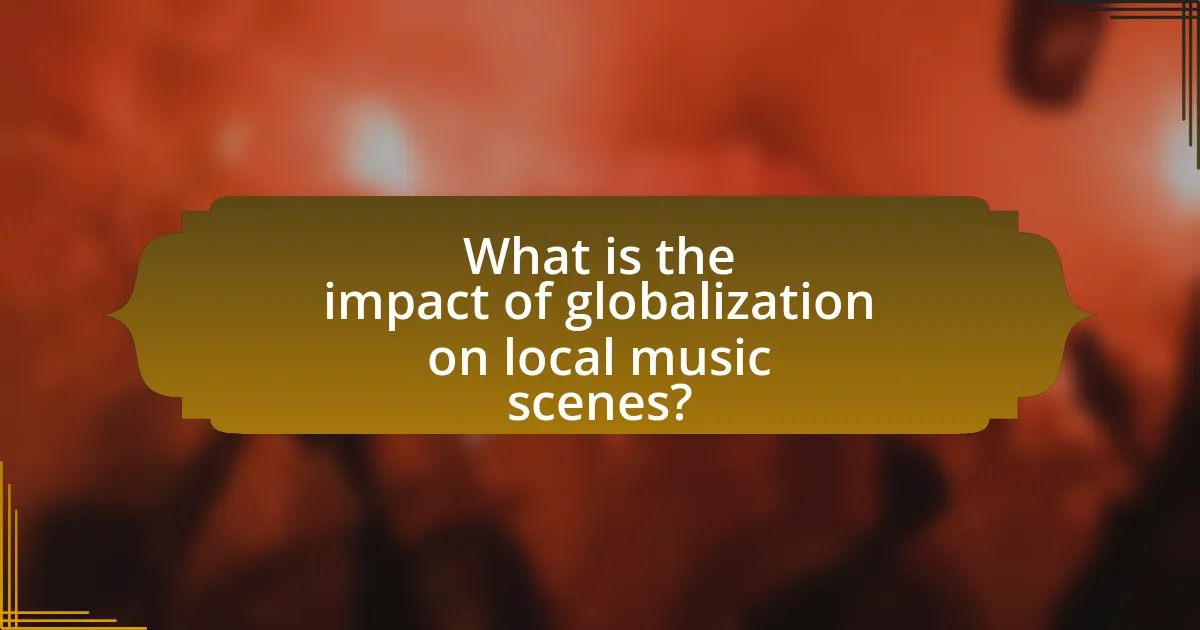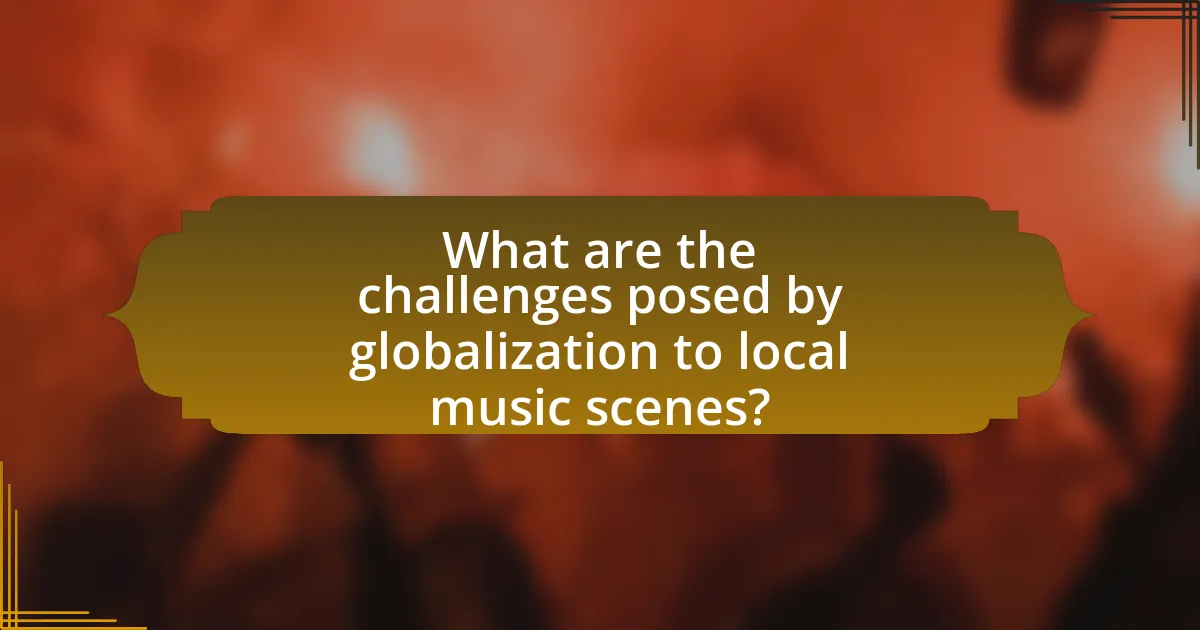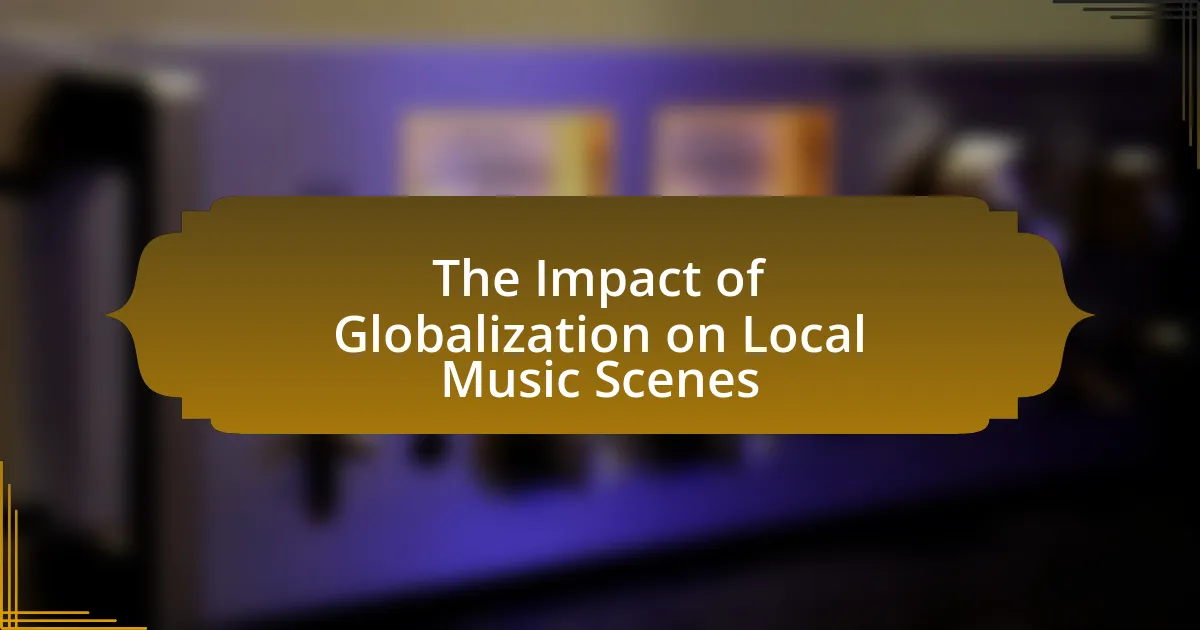The article examines the impact of globalization on local music scenes, highlighting how it facilitates the exchange of musical styles and cultural practices across borders. It discusses the fusion of local and global sounds, the increased visibility of local artists, and the challenges posed by dominant global music industries that may lead to homogenization. Key elements affected include cultural identity, musical styles, and audience engagement, while the preservation of local music is emphasized as crucial for maintaining cultural diversity. The article also explores the economic benefits and opportunities for local musicians in a global market, alongside strategies to combat the negative effects of globalization.

What is the impact of globalization on local music scenes?
Globalization significantly influences local music scenes by facilitating the exchange of musical styles, genres, and cultural practices across borders. This exchange often leads to the fusion of local and global sounds, resulting in new genres that reflect both local traditions and international trends. For instance, the rise of genres like reggaeton combines Latin rhythms with hip-hop influences, showcasing how local music adapts to global trends while maintaining its cultural roots. Additionally, globalization can lead to increased visibility for local artists on international platforms, allowing them to reach wider audiences and gain recognition beyond their geographical boundaries. However, it can also pose challenges, such as the overshadowing of local music by dominant global music industries, which may lead to a homogenization of musical expression.
How does globalization influence the diversity of local music?
Globalization significantly influences the diversity of local music by facilitating the exchange of musical styles, instruments, and cultural practices across borders. This exchange allows local musicians to incorporate global influences into their work, leading to hybrid genres that blend traditional elements with contemporary sounds. For instance, the rise of world music has seen genres like reggae, hip-hop, and electronic music merge with local traditions, creating unique musical expressions that reflect both local and global identities. Additionally, access to digital platforms enables artists to reach wider audiences, further promoting the fusion of diverse musical influences. This phenomenon is evidenced by the popularity of artists like Shakira, who combines Latin rhythms with pop, showcasing how globalization can enhance the richness and variety of local music scenes.
What are the key elements of local music that globalization affects?
Globalization affects key elements of local music, including cultural identity, musical styles, distribution channels, and audience engagement. Cultural identity is influenced as local music often incorporates global genres, leading to a blending of traditions. Musical styles evolve as artists adopt and adapt international influences, which can dilute original sounds. Distribution channels change as digital platforms enable global reach, impacting local music’s accessibility and market dynamics. Audience engagement shifts as listeners are exposed to a wider variety of music, altering their preferences and consumption patterns. These elements illustrate how globalization reshapes the landscape of local music scenes.
How does globalization alter traditional music forms?
Globalization alters traditional music forms by introducing new influences and technologies that reshape musical styles and practices. As global communication increases, traditional music often incorporates elements from various genres, leading to hybrid forms that blend local sounds with international trends. For instance, the rise of digital platforms allows artists to share their music globally, resulting in the fusion of traditional instruments with contemporary genres like pop and hip-hop. This phenomenon can be observed in the popularity of world music festivals, where diverse musical traditions are showcased and reinterpreted, reflecting a globalized cultural exchange.
Why is the preservation of local music important in a globalized world?
The preservation of local music is crucial in a globalized world because it maintains cultural identity and diversity. Local music reflects the unique traditions, languages, and histories of communities, serving as a vital expression of their heritage. According to UNESCO, cultural diversity is essential for human development, and local music plays a significant role in fostering this diversity. Furthermore, the decline of local music traditions can lead to homogenization, where global influences overshadow unique cultural expressions, resulting in the loss of distinct identities. Studies show that communities with strong local music scenes often experience enhanced social cohesion and community pride, reinforcing the importance of preserving these musical traditions in the face of globalization.
What role does cultural identity play in local music scenes?
Cultural identity plays a crucial role in local music scenes by shaping the genres, themes, and expressions that resonate within a community. This influence is evident as local musicians often draw from their cultural backgrounds to create music that reflects their unique experiences and traditions. For instance, in cities like New Orleans, the fusion of African, French, and Spanish influences has led to the development of jazz, a genre deeply rooted in the cultural identity of its inhabitants. Additionally, studies show that music serves as a vehicle for cultural preservation, allowing communities to maintain their heritage in the face of globalization. Research by the University of California, Berkeley, highlights how local music scenes adapt and evolve while still honoring their cultural roots, demonstrating the interplay between cultural identity and musical expression.
How can local music contribute to cultural preservation amidst globalization?
Local music contributes to cultural preservation amidst globalization by serving as a vehicle for expressing and maintaining unique cultural identities. Through traditional melodies, lyrics, and performance styles, local music encapsulates the history, values, and social narratives of a community. For instance, the resurgence of folk music in various regions has been documented to strengthen local identity and foster community cohesion, as seen in the revitalization efforts of indigenous music in countries like Canada and Australia. These efforts not only preserve cultural heritage but also promote awareness and appreciation of diverse cultural expressions in a globalized world.

What are the positive effects of globalization on local music scenes?
Globalization positively impacts local music scenes by facilitating cultural exchange and increasing access to diverse musical influences. This exchange allows local artists to incorporate global styles and genres into their work, enriching their sound and broadening their audience. For instance, the rise of digital platforms has enabled musicians from various regions to share their music internationally, leading to collaborations that blend different cultural elements. A notable example is the fusion of traditional African rhythms with Western pop, which has gained popularity and recognition worldwide. Additionally, globalization promotes the growth of music festivals that celebrate diverse genres, attracting both local and international talent, thereby enhancing the local music economy and community engagement.
How does globalization facilitate collaboration among musicians?
Globalization facilitates collaboration among musicians by enabling access to diverse cultural influences and technological platforms that connect artists worldwide. This interconnectedness allows musicians from different backgrounds to share ideas, styles, and techniques, leading to innovative musical fusions. For instance, platforms like YouTube and social media enable artists to collaborate remotely, breaking geographical barriers and fostering partnerships that would have been difficult in a pre-globalized world. Additionally, international music festivals and online collaborations have become more common, showcasing the blending of genres and cultures, which enriches the global music landscape.
What opportunities arise for local artists through global networks?
Local artists gain significant opportunities through global networks, including increased exposure, access to diverse markets, and collaboration with international artists. These networks allow local musicians to share their work on platforms like Spotify and YouTube, reaching audiences far beyond their geographical boundaries. For instance, a study by the International Federation of the Phonographic Industry (IFPI) in 2021 highlighted that 70% of music consumption now occurs online, enabling local artists to tap into global fan bases. Additionally, collaborations with artists from different cultures can lead to innovative musical styles and broaden artistic horizons, as seen in the rise of genres like reggaeton, which blends Latin and urban influences.
How can local music gain international exposure through globalization?
Local music can gain international exposure through globalization by leveraging digital platforms and social media to reach wider audiences. The rise of streaming services like Spotify and YouTube allows artists from diverse backgrounds to share their music globally, breaking geographical barriers. For instance, the global music market generated approximately $23 billion in revenue in 2020, with a significant portion attributed to independent artists who utilize these platforms. Additionally, collaborations with international artists can enhance visibility and credibility, as seen with the success of K-pop groups like BTS, who have integrated local sounds with global pop trends, resulting in a massive international fanbase.
What economic benefits does globalization bring to local music scenes?
Globalization brings several economic benefits to local music scenes, primarily through increased exposure and access to international markets. This exposure allows local artists to reach broader audiences, leading to higher sales of music and merchandise. For instance, platforms like Spotify and YouTube enable local musicians to distribute their work globally, resulting in revenue growth; in 2020, the global music industry generated $23.1 billion, with a significant portion attributed to independent artists leveraging these platforms. Additionally, globalization fosters collaboration between local musicians and international artists, enhancing creativity and attracting tourism, which further stimulates local economies. Events like music festivals often draw international visitors, contributing to local hospitality and service industries.
How does globalization impact local music festivals and events?
Globalization significantly impacts local music festivals and events by facilitating the exchange of cultural influences and broadening audience reach. This phenomenon allows local festivals to incorporate diverse musical styles and attract international artists, enhancing their appeal and competitiveness. For instance, festivals like Coachella in the United States showcase a mix of global genres, drawing attendees from various countries, which boosts local economies and promotes cultural exchange. Additionally, the rise of digital platforms enables local events to gain visibility beyond geographical boundaries, allowing them to connect with global audiences and sponsors. This interconnectedness can lead to increased funding and collaboration opportunities, ultimately enriching the local music scene.
What are the financial opportunities for local musicians in a global market?
Local musicians have several financial opportunities in a global market, primarily through digital distribution, international collaborations, and access to diverse revenue streams. Digital platforms like Spotify and Apple Music allow musicians to reach global audiences, significantly increasing their potential for sales and streaming revenue. According to the International Federation of the Phonographic Industry, global recorded music revenues grew by 7.4% in 2020, highlighting the expanding market for music consumption.
Additionally, local musicians can collaborate with international artists, which not only enhances their visibility but also opens doors to new markets and fan bases. This collaboration can lead to joint tours, merchandise sales, and shared promotional efforts, further increasing financial prospects.
Moreover, local musicians can leverage crowdfunding platforms and social media to finance projects and engage with fans directly, creating additional income opportunities. The rise of platforms like Patreon allows artists to receive ongoing support from fans, which can be a sustainable revenue source.
In summary, local musicians can capitalize on digital distribution, international collaborations, and innovative funding methods to thrive financially in a global market.

What are the challenges posed by globalization to local music scenes?
Globalization poses significant challenges to local music scenes by promoting homogenization and diminishing cultural diversity. As global music trends dominate, local artists often struggle to gain visibility, leading to a decline in unique regional sounds. For instance, the rise of streaming platforms has favored mainstream genres, making it difficult for niche local music to compete. Additionally, the influx of international music can overshadow local talent, resulting in reduced opportunities for local musicians to perform and be recognized. This trend is evident in various regions where traditional music styles are increasingly marginalized in favor of globally popular genres, threatening the sustainability of local music cultures.
How does globalization lead to the homogenization of music?
Globalization leads to the homogenization of music by facilitating the widespread dissemination of popular music genres across different cultures, resulting in a convergence of musical styles. This process occurs through the global reach of media platforms, such as streaming services and social media, which promote mainstream music trends and diminish local musical diversity. For instance, the dominance of genres like pop and hip-hop, driven by major record labels and digital platforms, has overshadowed traditional and regional music forms, leading to a standardized sound that appeals to a global audience. Consequently, local music scenes often adapt to these global trends, further contributing to the homogenization of music.
What are the risks of losing unique musical styles due to globalization?
The risks of losing unique musical styles due to globalization include cultural homogenization and the dilution of local traditions. As global music trends dominate, local artists may feel pressured to conform to mainstream sounds, leading to a decline in the diversity of musical expressions. For instance, the rise of pop music genres worldwide has overshadowed traditional forms, such as folk music, which are integral to cultural identity. Research indicates that in regions where global music influences are strong, such as in parts of Africa and Asia, traditional music styles have seen a significant decrease in popularity, threatening their survival. This trend highlights the potential loss of cultural heritage and the unique narratives that local music embodies.
How does the dominance of global music genres affect local artists?
The dominance of global music genres negatively impacts local artists by overshadowing their unique cultural expressions and limiting their market reach. As global genres like pop, hip-hop, and electronic music gain popularity, local artists often struggle to compete for attention and resources, leading to a decline in the visibility of indigenous music styles. For instance, a study by the International Federation of the Phonographic Industry (IFPI) in 2020 indicated that over 70% of music consumption worldwide is dominated by a few global genres, which diminishes the diversity of local music scenes. This trend can result in local artists feeling pressured to conform to global standards, potentially diluting their cultural identity and artistic authenticity.
What strategies can local musicians adopt to combat the negative effects of globalization?
Local musicians can adopt strategies such as emphasizing cultural authenticity, collaborating with other local artists, and leveraging digital platforms to promote their music. By focusing on cultural authenticity, musicians can create music that reflects their unique heritage, which can resonate more deeply with local audiences and differentiate them from globalized music trends. Collaborating with other local artists fosters community support and strengthens local music scenes, as seen in initiatives like the “Local Music Week” in various cities that promote regional talent. Additionally, utilizing digital platforms like social media and streaming services allows musicians to reach wider audiences while maintaining control over their artistic identity, as evidenced by the success of independent artists who have built substantial followings online without major label support.
How can local music scenes promote their unique identities in a globalized context?
Local music scenes can promote their unique identities in a globalized context by leveraging digital platforms to showcase their distinct sounds and cultural narratives. These platforms, such as social media and streaming services, allow local artists to reach global audiences while maintaining their cultural authenticity. For instance, the rise of platforms like Bandcamp and SoundCloud has enabled artists from diverse backgrounds to share their music without the need for traditional record labels, thus preserving their unique styles and stories. Additionally, local music festivals that highlight regional genres can attract international attention, fostering cultural exchange and appreciation. This approach not only enhances visibility but also strengthens community ties, as local audiences engage with and support their artists.
What role do community initiatives play in supporting local music against globalization?
Community initiatives play a crucial role in supporting local music against globalization by fostering cultural identity and providing platforms for local artists. These initiatives, such as community festivals, local music venues, and grassroots organizations, create opportunities for musicians to showcase their work, thereby preserving unique musical traditions that may be overshadowed by global trends. For instance, studies have shown that local music festivals can increase community engagement and economic support for local artists, as seen in events like the Newport Folk Festival, which highlights regional talent and attracts tourism. By promoting local music, these initiatives help maintain cultural diversity and resist the homogenizing effects of globalization.
What practical steps can local musicians take to thrive in a globalized music industry?
Local musicians can thrive in a globalized music industry by leveraging digital platforms for distribution and promotion. Utilizing streaming services like Spotify and Apple Music allows musicians to reach international audiences, as these platforms have millions of users worldwide. Additionally, engaging on social media platforms such as Instagram and TikTok can help local musicians build a fan base and connect with listeners globally.
Collaborating with artists from different regions can also enhance visibility and introduce local sounds to new markets. According to a report by the International Federation of the Phonographic Industry (IFPI), 70% of music consumers discover new music through online platforms, highlighting the importance of digital presence. Furthermore, participating in global music festivals and competitions can provide exposure and networking opportunities, essential for growth in a competitive landscape.
